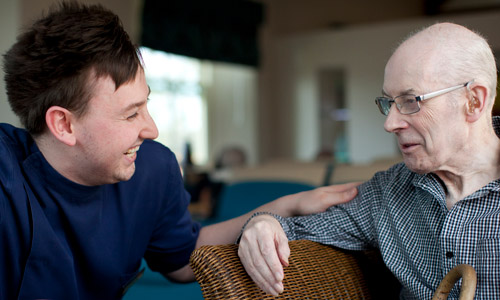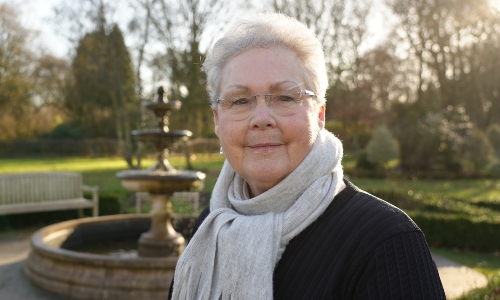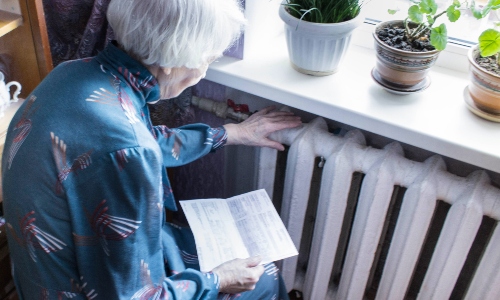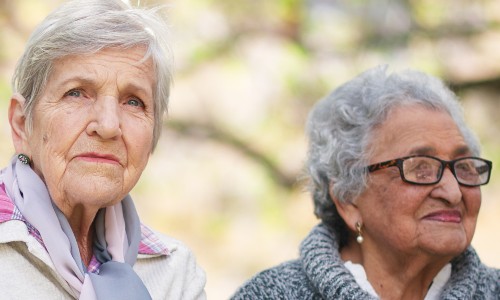Everyone who supports our older population deserves our gratitude, which is why I offer heartfelt thanks on behalf of Age UK for all you have done so far this year, and will do during this Christmas period.
Living with the pandemic
As I write there is a sense of déjà vu: like last year, Christmas is almost upon us and talk of ‘lockdown’ is in the air. If more restrictions are imposed soon, as seems likely, it will be disappointing and frustrating, but it will be because what’s going on with the virus leaves the decision makers with no choice. Whatever happens I hope we will resist the temptation to ‘shoot the messenger’ – people like Chris Whitty – who are only doing their job in providing their expert advice. It’s not their fault that it’s often what we’d rather not hear.
It’s also important to remember that what we are all enduring is ‘not normal’ and is imposing a unique set of pressures on us all. I am sure that tomorrow’s young people will ask their parents and grandparents who are living with it now, ‘what was it like during the pandemic?’ This strange time will go down in history, just like the 1918 Spanish flu pandemic. Let’s all hope it really is a once in a century event.
Recognising everyone who's helped older people this year
If we can manage it, despite all the anxiety, weariness and fatigue, it’s surely a time to be as kind as we can be to each other, and grateful for the good things, and that’s really the topic of this blog. Above all, I want to thank everyone who has helped make life that much better and more bearable for older people during this second year of the pandemic, many of whom will be working full pelt and under great stress this Christmas.
I want to begin with the legions of unpaid caregivers who are the backbone of care for older people everywhere. A massive four million of them are older people themselves. These older carers are typically supporting their partner and often do not see themselves as carers at all – just ordinary people doing what you do for your ‘other half’, knowing it’s what they would do for you.
Next are the volunteers and staff in our wonderful local Age UKs and in many other voluntary organisations too, who do such a brilliant job supporting older people in their local communities, as well as in residential settings of all kinds. Sometimes regarded as ‘the icing on the cake’, increasingly in many places they are ‘the cake’ – providing vital support for older people who would otherwise have none.
Then there are the social care staff who work in care homes, supported living facilities and in older people’s own homes, whether as visiting or live in carers. It is impossible to overstate how crucial their contribution is to millions of older people’s health, happiness and wellbeing, their survival too in many instances. They are providing a vital public service, whoever actually employs them.
And last but not least there’s the NHS and everyone who works in it: the doctors and nurses obviously but so many others as well – porters, cooks, cleaners, paramedics, ambulance crew, physios, OTs, and the admin staff and managers too.
Our support for everyone on duty this Christmas
We know that whatever happens with the Omicron variant, this Christmas is going to be really tough. Many more of us are expected to become sick, piling extra pressure onto staff and volunteers who stay well as they try to plug the gaps. Some workers, especially in the NHS and social care, will be finding it hard not to recall distressing times they experienced earlier in the pandemic and dreading anything like that happening again. Hopefully it won’t, but as a community we need to recognise what we ask some people to do and be prepared to give them our love and support, both now and well into the future too.
How Government can help
With the pandemic deepening again and elongating, and the impact on all those people I have mentioned intensifying, here are five thoughts about how the Government could help.
1. The Association of Directors of Social Services (ADASS) asked the Government in the autumn for substantial funding to provide more respite support and breaks for unpaid caregivers, to help them keep going. The Government – the Treasury – said no. It should think again. In so far unpublished research Age UK has found that this kind of support has all but disappeared in many areas as a result of funding cuts and the pandemic – a dangerous place for us to be in, given our reliance on unpaid care.
2. The NHS should urgently seek to reduce the red tape surrounding how it contracts with voluntary organisations this winter. There is a clear sense among my colleagues that the sector could be doing more to help; unusually, money is not the biggest barrier it seems, but bureaucracy. Let’s sort it out.
3. Just about everyone with an interest in social care called on the Government to put more money in care workers’ pockets this winter, to support retention. A small amount was made available for this purpose but too little to be noticeable, even for those on a low income, and many staff haven’t yet received anything at all. An increase would help, plus an effective system for getting the money out.
4. The Government – the Treasury – should extend the funding for hospitals to pay for care for older people in the weeks after they are discharged – it’s due to run out in the Spring. ‘Discharge to assess’ isn’t working as it should do, largely due to the pressures in the system and shortages of care staff, but putting it on a solid financial basis for the future would help and Age UK supports the approach in principle.
5. The Government and NHS should urgently review and expand their resilience plans, so we can be better prepared for whatever comes in the next few weeks and months, including the possibility of catastrophic staff shortages in the NHS and social care if Omicron becomes very widespread. Looking further ahead, the Government should also accept Jeremy Hunt’s amendment to the Health and Care Bill, which would force Government to do proper workforce planning for health and care in future, and be transparent about it too.
It’s deeply regrettable that the public debate about responding to the virus has become so fractured and the messaging from the top so muddled. Meanwhile, millions of ordinary people, paid and unpaid, continue to play a crucial role supporting our older population, often putting their own health and wellbeing at risk in the process. At Age UK we believe we must support them in every way we can.
Send a message on social media
We thought you’d like to join in if you’re on social media. We’ve written a message for you to share but please do add your own words or tag in any local NHS staff or caregivers who you are particularly grateful for.





